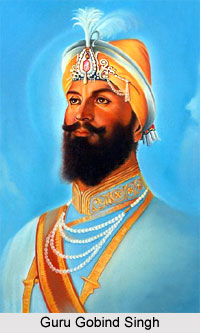 Guru Gobind Singh fought almost nine battles with the Mughal army after the creation of the Khalsa. His conquests have been described below:
Guru Gobind Singh fought almost nine battles with the Mughal army after the creation of the Khalsa. His conquests have been described below:
Battle of Anandpur
The battle was fought in the year 1699. The Viceroy of Delhi sent a force of 10,000 men under Paindah Khan, Din Beg against Guru Gobind Singh. Some hill chiefs also joined them at Ropar. Guru Gobind Singh faced them with his strong army near Anandpur Sahib. In the battle, Paindah Khan was killed and Din Begh and the hill rajas ran away. Thus the Sikhs won the battle.
Second Battle of Anandpur
This battle was also fought in the year 1699. The hill rajas under the leadership of Bhim Chand sent a message to the Guru to vacate Anandpur. The Guru gathered the Sikhs and prepared them to fight for their survival. The siege lasted about three months. The Raja Kaiser Chand and Ghamand Chand of Kangra lost their lives while the defeated army fled away.
Battle of Nirmohi
The battle was fought in 1700. A strong contingent of Mughal army joined by hill rajas advanced towards Anandpur. The Sikh forces under the Guru intercepted them at Nirmohi, 5 miles short of Anandpur, and drove them away.
Battle of Bharsali
In this battle, fought in the year 1700 Wazir Khan of Sirhind personally assumed the command and attacked Anandpur. The Sikh force was defeat and retreated towards Bharsali about 40 km from Anandpur. The invaders kept pursuing the Sikhs and another battle took place at Bharsali. After some time, the Mughal army left for Sirhind and the Sikhs reoccupied Anandpur.
Third Battle of Anandpur
The third battle of Anandpur was fought in 1702. The Mughal commander Sayyad Beg and Alif Khan were then returning to Delhi. Bhim Chand persuaded them to help him expel the Sikhs from Anandpur and agreed to pay them Rs. 1,000 per day. However, due to certain differences that arose in the invading army, they left the area.
Fourth Battle of Anandpur
Bhim Chand again made an alliance with few hill rajas and marched towards Anandpur in 1703. The Sikhs forces under Guru Gobind Singh met them outside the town and a tough battle ensued. The hill rajas were defeated and fled away.
Fifth Battle of Anandpur
In the year 1703 Bhim Chand taking the help of the Mughal Viceroy at Delhi led a strong force against the Guru and his army. The later too organised an army with Sayyad Beg and Maiman Khan. However, the enemy forces were able to defeat the Sikhs and drive them out of Anandpur. The Sikhs returned back when the heavily laden enemy troops were moving out. A fierce battle was fought and the Sikhs recovered back Anandpur.
Sixth and Last Battle of Anandpur
Anandpur was besieged in September 1704 by the Mughal forces from Delhi, Sirhind, Lahore and Jammu and the Hindu hill rajas of Guler, Kangra and others. The entire force was under Wazir Khan the faujdar of Sirhind. The Sikhs had mounted two guns on the fort and they took a heavy toll of the enemy troops. In the battle Wazir Khan lost almost 900 men on the very first day. All the routes were blocked. Besides, there was also acute shortage of food and supply of war materials. Thus the Guru decided to leave Anandpur on December 1704. Wazir Khan with his army immediately attacked the Guru`s camp that resulted in lots of casualties. The Guru`s family was also separated. He thus marched towards Chamkaur. There he settled down in a mud built double storied house with a large compound. By the next morning the enemy army surrounded the house with artillery. An envoy was sent to the Guru asking him to surrender. By evening only five Sikhs were left with the Guru. His two elder sons had also died fighting. The five Sikhs met in a conclave and took the decision that the Guru should escape. They related their plan to the Guru which was accepted by him with much reluctance.




















